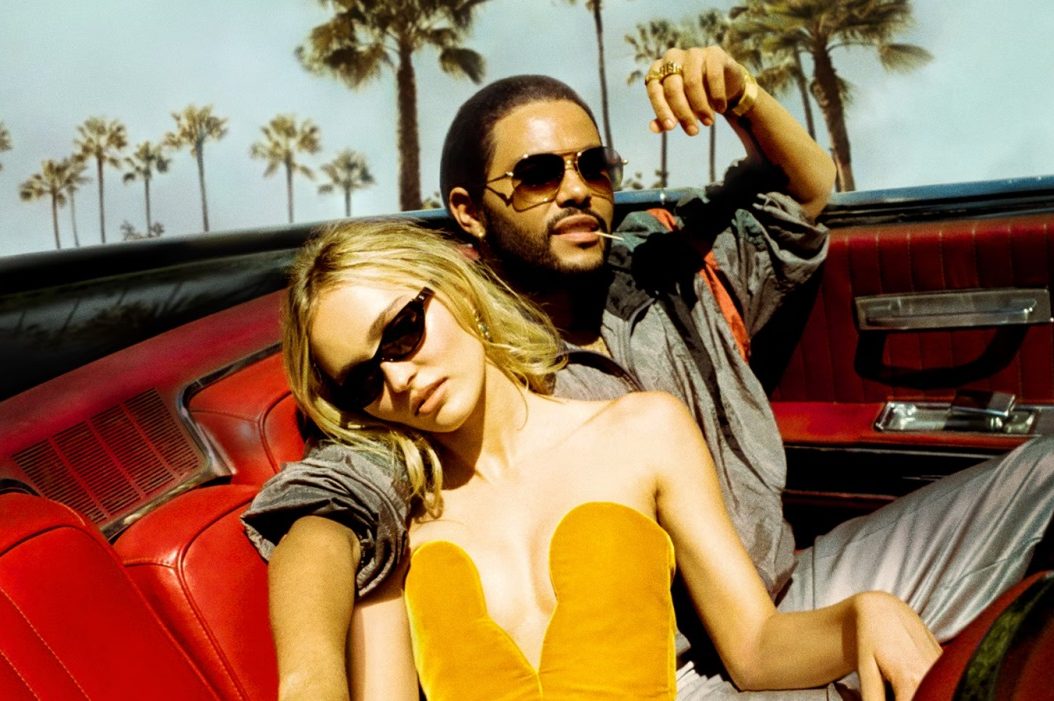For a show that purports to be a biting satire about the entertainment industry and all the ways that female pop stars in particular are exploited and victimized by hangers-on who see them as nothing more than sexy little cash-cows, The Idol sure loves to leer at its lead actress. We hear her speak, sometimes, and reveal vague, barely cobbled-together attempts at a backstory and a current dilemma (“dead mom” and “thinks her new album, and pop music writ large, is ‘too superficial,’” respectively), but for the most part, as Jocelyn, we mostly see Lily-Rose Depp wordlessly writhing and pouting. In the show’s first episode alone, she’s writhing and pouting in the slow-motion shots of her dancing, zoomed in on her ass cheeks poking out of her skirt, and she’s writhing and pouting with her tits out during a gratuitous photo shoot. (Depp’s nipples are basically omnipresent on this show.) The camera loves to linger on her for just a little too long, and the cinematography is all soft focus, slow-motion and tight shots that feel just a little too 1980s Cinemax as we see her masturbating while choking herself after a night out at the club.
It doesn’t feel great to see a show that’s supposed to be a critique of this sort of thing so unabashedly objectify its young lead, and it feels even worse when you add the context of the lengthy Rolling Stone exposé that came out ahead of the show’s premiere alleging a toxic workplace on set and calling the series “torture porn” and a “rape fantasy.” Director Sam Levinson (perhaps best known as the mastermind behind Euphoria) seems unbothered by the allegations — even grateful for them, because they give him an opportunity to present his unoriginal schlock as “edgy.” “When my wife read me the article,” he told reporters in Cannes after the show premiered at the film festival, “I looked at her and I said, ‘I think we’re about to have the biggest show of the summer.’”
Hype is one thing, but in order for that to be true, The Idol would need to be halfway decent — or at least not actively terrible. Unfortunately, it is, in fact, actively terrible. The series, which follows a damaged pop star who’s preyed upon by everyone in her orbit (“Mental illness is sexy,” her manager insists while defending the choice to have her pose coyly with a hospital bracelet on after a recent nervous breakdown) who falls for a mysterious club owner-turned-cult leader named Tedros (played by Abel “The Weeknd” Tesfaye), pats itself on the back at just about every turn, convinced it’s groundbreaking and important. There are moments where you can sense that they’re trying to poke fun at the crass, unlikeable team of people who make a living profiting off of Jocelyn in the same way shows like Veep and Succession encouraged us to laugh at objectively terrible people — but in order for a show to be a satire, it has to actually be funny. There aren’t really any jokes that land here, and more often than not the show feels like the exact thing it’s attempting to spoof. (Maybe if you’re making a show about entertainers being exploited, you shouldn’t include a lengthy sequence where an on-set intimacy coordinator is presented as a humorless prude and subsequently locked in a bathroom?)
The Idol is about a Gen Z starlet, and yet everything about it feels like it was written by a middle-aged man. Lily-Rose Depp was not yet alive when “…Baby One More Time” came out in 1999, but her character’s choreography, we’re told, pays homage to Britney Spears. She and her best friend watch Basic Instinct at home and dance to Madonna’s “Like a Prayer” at the club. She and Tedros talk about Prince’s artistry — something that feels especially infuriating because Tedros seems like the kind of guy who bought a Prince costume at Party City for Halloween once but is completely devoid of any of the necessary charisma to pull it off. He tells her that her vocals sound like she doesn’t “know how to fuck,” and it’s presented as this edgy, genius insight when, in fact, it’s the kind of thing producers have been saying to singers since Elvis was still alive. His version of foreplay is to position her like a doll and rub an ice cube all over her body while the camera zooms in, and frankly, it was better when Spike Lee did it 34 years ago in Do the Right Thing.
There are some unanswered questions here: Is it anti-Semitic to have Eli Roth play a brash character named “Finkelstein” who wears oversized sunglasses, yells into a tiny Bluetooth headset and is only concerned with making as much money as possible, or just a tired cliche? Are we really supposed to think that a guy with a rattail who unironically wears a duster and says things like “hello, angel” is supposed to be cool and captivating and not, in fact, an enormous dweeb? And please, for the love of god, what accent is Hank Azaria attempting to do?
Through it all, it’s painfully obvious that The Idol considers itself to be a gritty, controversial series. The points it tries to make, however, are so unoriginal and basic that it feels like a film-school project made by a kid who has never actually had sex but watched a lot of porn. Oh, really, the entertainment industry is seedy and bad? People in this business have sex and do drugs? Whoa, dude. It’s hard to argue that you’re groundbreaking (or even relevant, for that matter) when you’re basically the TV version of Showgirls — only less entertaining.
This article was featured in the InsideHook newsletter. Sign up now.
